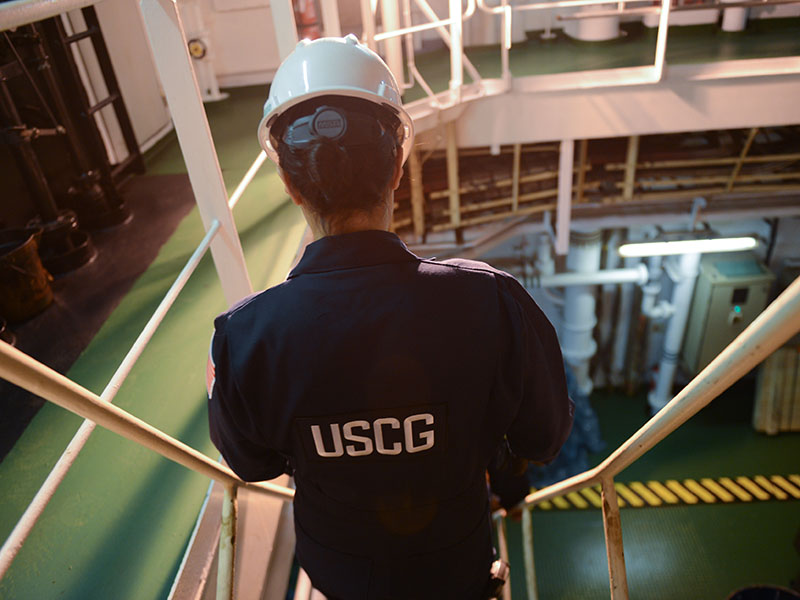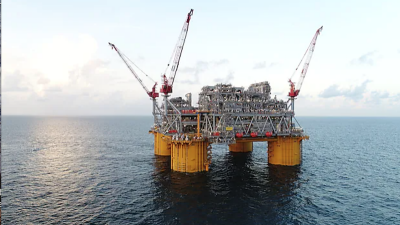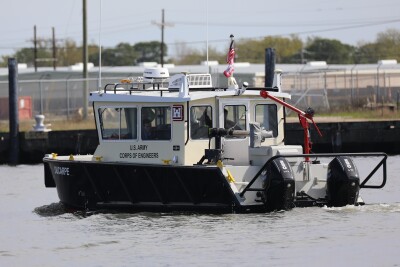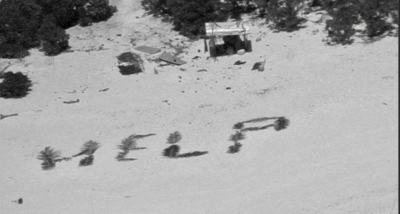Coast Guard funding has lapsed due to the partial federal government shutdown, but the service is required to continue some operations and activities.
In general, the Coast Guard will continue operations authorized by law that provide for national security or protect life and property. However, certain administrative functions will be limited, the Coast Guard said in a Marine Safety Information Bulletin (MSIB) released yesterday.
Generally, vessels with current COIs will still be inspected as required by law. This includes both topside and drydock exams. New construction may be affected due to the reduced number of Coast Guard marine inspectors and plan reviewers at the Marine Safety Center, the Passenger Vessel Association noted in an update released today.
PVA emphasized that for operators, planning is key to weathering the current situation. Be sure to provide the Coast Guard with enough time to schedule inspections, and talk with other operators in your area and try to coordinate inspections geographically. If you still are within the 90-day window on either side of an annual inspection, use that flexibility to schedule a Coast Guard inspection at a later date. If a company's boat is in the shipyard, try to have multiple call-out items ready rather just a single item. Document all work with photographs, reports, etc.
There are provisions for vessel documentation and merchant mariner credential extensions that will allow boats and their crews to continue to operate, the PVA noted.
In the Coast Guard MSIB, the service offered guidance to vessel owners, operators, and other affected parties during the lapse in appropriations.
Certificates of Financial Responsibility: The National Pollution Funds Center (NPFC) will not process Certificate of Financial Responsibility (COFR) applications during the lapse in appropriations. Captains of the Port (COTPs) will continue to verify that vessels maintain a COFR, as applicable (see 33 CFR 138.15) via NPFC “Vessel COFR Search” website. If the COTP determines that a vessel does not have a COFR, but is required to, the COTP may contact the NPFC Command Duty Officer to assist with compliance determinations. Certificates of Documentation Processing commercial vessel documentation requests including renewals cannot be accomplished without violating the Anti-Deficiency Act. CODs for commercial vessels will not be processed, except for those necessary to meet national defense requirements (e.g., vessels enrolled in the Maritime Security Program (MSP) or those vessels actively carrying Department of Defense (DoD) cargo). However, vessel owners and operators should continue to submit renewal applications to the NVDC prior to the expiration of the COD.
In such cases, the following additional guidance is provided:
Vessels Engaged on Domestic Voyages Only (Coastwise/Fisheries): Vessel owners and operators with a COD that expired on or before January 31, 2019, may continue to operate domestically on the previously issued trade endorsements provided a renewal application has been submitted to the NVDC. Vessel owners should be prepared to present evidence, upon request, to the Officer in Charge, Marine Inspection (OCMI) or the Office of Commercial Vessel Compliance (CG-CVC), that a renewal application was submitted.
New Construction/Initial Certification (All Trade Endorsements): In accordance with the Marine Safety Manual, Vol. II, an initial COI may be completed before the COD is issued provided the NVDC has received the application for documentation. Vessel representatives should be prepared to present evidence that the application was submitted to the NVDC, upon request, to the OCMI. This release has been issued for public information and notification purposes only.
Engaged on International Voyage (Registry Endorsement): Vessel owners and operators with a COD that expired on or before Jan. 31, 2019, that actively engage on international voyages, and are subject to Port State Control, may apply for dispensation from CG-CVC for continued operation. Dispensation requests related to CODs should be sent to [email protected] and include objective evidence that a renewal application has been submitted to the NVDC.
Merchant Mariner Credentials (MMCs): The National Maritime Center (NMC) and all Regional Exam Centers (RECs) will be closed. No MMCs will be processed during the lapse in appropriations except for those necessary to meet national defense requirements (e.g., mariners serving aboard MSP Vessels, active Military Sealift Command (MSC) vessels, or those vessels actively carrying DoD cargo).
The following additional guidance is provided:
National Endorsements: Mariners operating on national endorsements should carry a copy of the general extension that was granted by NMC.
Standards of Training, Certification, and Watchkeeping (STCW) Endorsements: Mariners operating on STCW endorsements that expired on or after December 22, 2018 may continue to sail on such endorsements provided that a renewal application has been submitted to the NMC and the company has applied to the Coast Guard for dispensation in accordance with STCW Article VIII. Requests for dispensation should be submitted via email from the company to [email protected] and include the name of the vessel, vessel IMO number, name of mariner, the merchant mariner reference number, and capacity under which employed. The Coast Guard will consider dispensation requests in accordance with the process and standards of STCW Article VIII.
Standards of Training, Certification, and Watchkeeping (STCW) Medical Certificates: The Coast Guard considers the lapse in appropriations to be an urgent situation. Mariners holding medical certificates that expired on or after Dec. 22, 2018 may continue to work under the certificate in accordance with the standards of STCW Regulation I/9.
A list of cognizant OCMI/COTP contacts is available on the Office of Commercial Vessel Compliance webpage.





